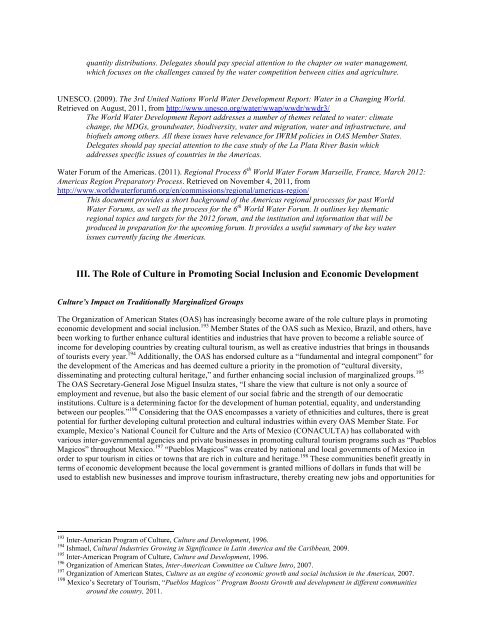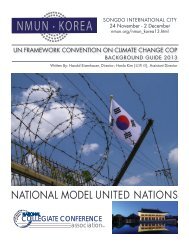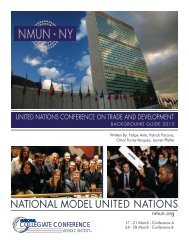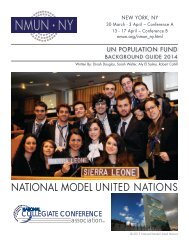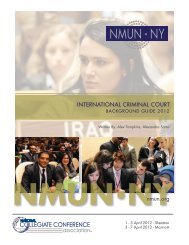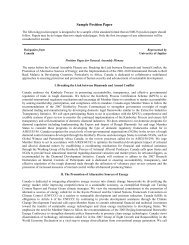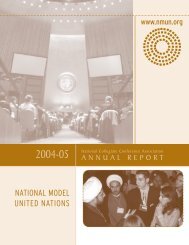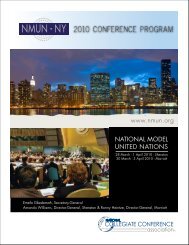Organization of American States - National Model United Nations
Organization of American States - National Model United Nations
Organization of American States - National Model United Nations
Create successful ePaper yourself
Turn your PDF publications into a flip-book with our unique Google optimized e-Paper software.
quantity distributions. Delegates should pay special attention to the chapter on water management,<br />
which focuses on the challenges caused by the water competition between cities and agriculture.<br />
UNESCO. (2009). The 3rd <strong>United</strong> <strong>Nations</strong> World Water Development Report: Water in a Changing World.<br />
Retrieved on August, 2011, from http://www.unesco.org/water/wwap/wwdr/wwdr3/<br />
The World Water Development Report addresses a number <strong>of</strong> themes related to water: climate<br />
change, the MDGs, groundwater, biodiversity, water and migration, water and infrastructure, and<br />
bi<strong>of</strong>uels among others. All these issues have relevance for IWRM policies in OAS Member <strong>States</strong>.<br />
Delegates should pay special attention to the case study <strong>of</strong> the La Plata River Basin which<br />
addresses specific issues <strong>of</strong> countries in the Americas.<br />
Water Forum <strong>of</strong> the Americas. (2011). Regional Process 6 th World Water Forum Marseille, France, March 2012:<br />
Americas Region Preparatory Process. Retrieved on November 4, 2011, from<br />
http://www.worldwaterforum6.org/en/commissions/regional/americas-region/<br />
This document provides a short background <strong>of</strong> the Americas regional processes for past World<br />
Water Forums, as well as the process for the 6 th World Water Forum. It outlines key thematic<br />
regional topics and targets for the 2012 forum, and the institution and information that will be<br />
produced in preparation for the upcoming forum. It provides a useful summary <strong>of</strong> the key water<br />
issues currently facing the Americas.<br />
III. The Role <strong>of</strong> Culture in Promoting Social Inclusion and Economic Development<br />
Culture’s Impact on Traditionally Marginalized Groups<br />
The <strong>Organization</strong> <strong>of</strong> <strong>American</strong> <strong>States</strong> (OAS) has increasingly become aware <strong>of</strong> the role culture plays in promoting<br />
economic development and social inclusion. 193 Member <strong>States</strong> <strong>of</strong> the OAS such as Mexico, Brazil, and others, have<br />
been working to further enhance cultural identities and industries that have proven to become a reliable source <strong>of</strong><br />
income for developing countries by creating cultural tourism, as well as creative industries that brings in thousands<br />
<strong>of</strong> tourists every year. 194 Additionally, the OAS has endorsed culture as a “fundamental and integral component” for<br />
the development <strong>of</strong> the Americas and has deemed culture a priority in the promotion <strong>of</strong> “cultural diversity,<br />
disseminating and protecting cultural heritage,” and further enhancing social inclusion <strong>of</strong> marginalized groups. 195<br />
The OAS Secretary-General Jose Miguel Insulza states, “I share the view that culture is not only a source <strong>of</strong><br />
employment and revenue, but also the basic element <strong>of</strong> our social fabric and the strength <strong>of</strong> our democratic<br />
institutions. Culture is a determining factor for the development <strong>of</strong> human potential, equality, and understanding<br />
between our peoples.” 196 Considering that the OAS encompasses a variety <strong>of</strong> ethnicities and cultures, there is great<br />
potential for further developing cultural protection and cultural industries within every OAS Member State. For<br />
example, Mexico’s <strong>National</strong> Council for Culture and the Arts <strong>of</strong> Mexico (CONACULTA) has collaborated with<br />
various inter-governmental agencies and private businesses in promoting cultural tourism programs such as “Pueblos<br />
Magicos” throughout Mexico. 197 “Pueblos Magicos” was created by national and local governments <strong>of</strong> Mexico in<br />
order to spur tourism in cities or towns that are rich in culture and heritage. 198 These communities benefit greatly in<br />
terms <strong>of</strong> economic development because the local government is granted millions <strong>of</strong> dollars in funds that will be<br />
used to establish new businesses and improve tourism infrastructure, thereby creating new jobs and opportunities for<br />
193 Inter-<strong>American</strong> Program <strong>of</strong> Culture, Culture and Development, 1996.<br />
194 Ishmael, Cultural Industries Growing in Significance in Latin America and the Caribbean, 2009.<br />
195 Inter-<strong>American</strong> Program <strong>of</strong> Culture, Culture and Development, 1996.<br />
196 <strong>Organization</strong> <strong>of</strong> <strong>American</strong> <strong>States</strong>, Inter-<strong>American</strong> Committee on Culture Intro, 2007.<br />
197 <strong>Organization</strong> <strong>of</strong> <strong>American</strong> <strong>States</strong>, Culture as an engine <strong>of</strong> economic growth and social inclusion in the Americas, 2007.<br />
198 Mexico’s Secretary <strong>of</strong> Tourism, “Pueblos Magicos” Program Boosts Growth and development in different communities<br />
around the country, 2011.


